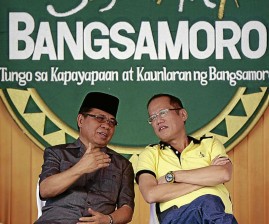
PEACEMAKERS’ CHAT President Aquino listens to Murad Ebrahim, chairman of the Moro Islamic Liberation Front (MILF), at the launch of the Sajahatra (blessings, prosperity and peace) Bangsamoro program in Sultan Kudarat town in Maguindanao. The government and the MILF have forged an interim peace deal. FILE PHOTO
OZAMIZ CITY, Philippines—The government and the Moro Islamic Liberation Front have finally agreed on a detailed roadmap for setting up the Bangsamoro autonomous political entity by 2016.
During the three-day 36th exploratory meeting in Kuala Lumpur that ended Wednesday, the parties firmed up the Annex on Transitional Arrangements and Modalities (TAM), their joint statement said.
“This has been a very fruitful round, a very happy one, with the signing of the Annex on Transitional Arrangements and Modalities. We actually had a draft as early as December and finally now we are signing it,” government chief negotiator Miriam Coronel-Ferrer said in a news release issued by the Office of the Presidential Adviser on the Peace Process (OPAPP).
Coronel-Ferrer said that as with other contentious issues that took a long time to tackle, “they’ve been solved, we found the language.”
Wednesday’s session of the panels ended at 9:49 p.m., according to an OPAPP tweet.
It was said to be the longest session after their 13-hour meeting October last year that led to the preliminary Framework Agreement.
The Transitional Arrangements and Modalities outlines a transition process with eight components. The process starts with the creation of the Transition Commission (TransCom), which President Aquino has already accomplished, and ends with an Exit Document that terminates the peace negotiation “if and only when all agreements have been fully implemented.”
The other transition steps include the crafting and eventual ratification of a Basic Law that will serve as the charter of the Bangsamoro; the identification of proposals for Constitutional amendments to entrench the peace pact in the country’s legal framework; the operationalization of the MILF-led Bangsamoro Transition Authority (BTA); and periodic third-party monitoring of the implementation of all agreements.
Once the Basic Law is ratified by voters in the affected areas, the BTA takes over powers from the Autonomous Region in Muslim Mindanao and will “set up the institutions and mechanisms necessary to establish the Bangsamoro ministerial government.”
The question of who leads the BTA was one of the kinks in previous meetings.
The peace roadmap also laid out the four bodies that will oversee the different phases of the peace transition. These are the TransCom, BTA, Third Party Monitoring Team (TPMT), and the Joint Normalization Committee (JNC).
The parties already approved the Terms of Reference of the TPMT last January. It will principally monitor and evaluate implementation of all agreements.
The JNC coordinates with government and the MILF in the maintenance of peace and order in the Bangsamoro until the decommissioning of the group’s armed wing in step with the demilitarization of the region.
During the recent meeting, the parties also signed the Terms of Reference for the Independent Commission on Policing (ICP).
According to the joint statement, the ICP will submit recommendations to the peace panels on the appropriate form, structures and relationships of the Bangsamoro police force.
The framework agreement sought to establish a Bangsamoro police force that is civilian in character, professional, and free from partisan political control.
The seven-member ICP will be composed of a mutually chosen chair, two local experts, two international experts, and two representatives of the parties. The parties will each nominate the experts.
In their joint statement, the peace panels “express profound appreciation” to Dr. David Gorman of the Center for Humanitarian Dialogue (CHD) for his long involvement and “valuable contributions to the GPH-MILF peace process.”
A mediation expert, Gorman is CHD country representative in the Philippines and has actively participated in the International Contact Group of the Mindanao peace process since its creation in 2009.
He was recently appointed CHD’s director-general for Eurasia.